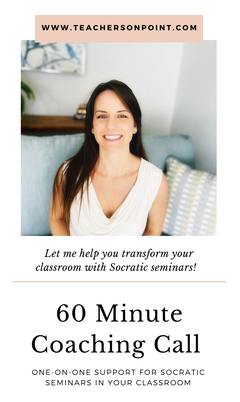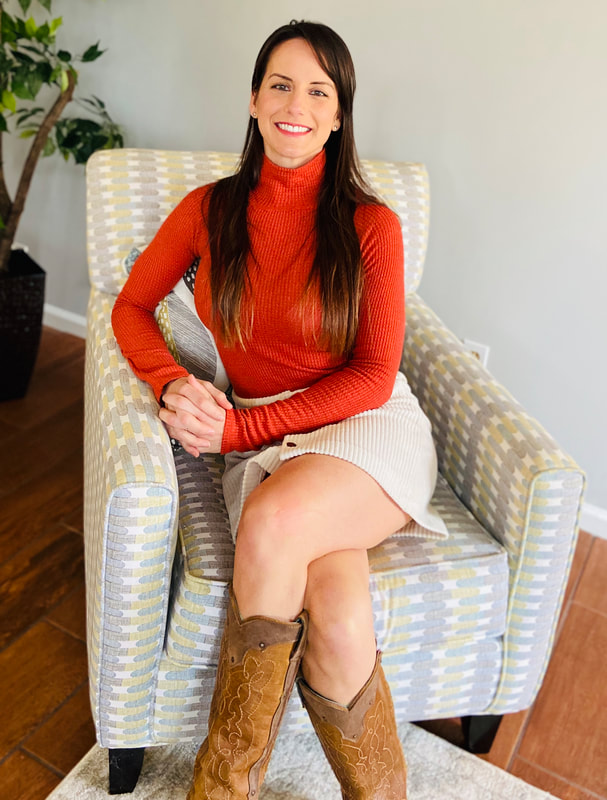|
There used to be many different reasons to use the Socratic method in classrooms, but after the response to the pandemic and holding kids in their homes and OUT of the classroom for years, it's become even more crucial of a method of teaching. Below I talk about what Socratic seminars are, why they are beneficial to students of upper elementary all the way through high school and how you can begin to use this method in your classroom. What are Socratic seminars?Socratic seminars are a method of teaching that essentially put the "teaching" into the hands of students through classroom discussions. It's facilitated by the teacher, but directed by the students. They come to class prepared by having done a teacher selected reading or video, perhaps even listening to a podcast or solving a math problem. Students also will have completed some of, what I like to call, "thinking work" which could be in the form of notes, questions written out or even summaries of their understanding. The class comes together in a circle with their prepared work and they have a discussion. This can be done with any subject. In math for example, students will discuss the different strategies they used to solve a problem. The class will critically think about the different ways people solved for an answer and decide two things: which method makes the most sense to them and two: do the methods being discussed solve the problem correctly. In Language Arts, Science and Social Studies, the students are thinking critically about the information they learned. In reading for example, they are asking each other to explain the thinking because most of the time, students have thought differently about the text. They articulate their use of comprehension strategies in a natural way as they are being asked questions or simply asked to explain their thinking. So how is this beneficial to students?Socratic seminars benefit students in a number of ways. For one, it's been obvious to anyone who works with kids recently that they are sometimes literally unable to articulate their thoughts. We can look at research or just use our common sense to conclude that before we had the pandemic, where kids were housebound and cut off from their peers and school, we had technology playing a part in their everyday lives in a way that didn't require them to communicate verbally with each other. And these things were taking over. Apps such as Discord, video games, text messaging and social media have created a paralyzation in verbal communication. Add to the fact that many kids were told they could not see or play with their friends and they would also be kept from the classroom, well, it was a recipe for disaster. And we, as teachers, are in a position where we can help our students gain back these very important necessary skills. Where can you start? How to Implement Socratic seminars into your classroomIf you haven't already, download the free conversation poster and discussion packet from my website. These two teaching tools will help guide you in having your first whole class discussion (Socratic seminar) with your students.
Day One 1. Get your students to buy into this method. Chances are, it won't take much because kids love to talk and to feel like they are in charge. Two things they get to do with this method of teaching. 2. Display the conversation poster and explain that they will be holding a conversation without much direction from you AFTER they show you that they can follow these steps. The poster explains what to do if you are a speaker and what to do if you are listening. Go through each one very explicitly, no matter what grade you teach. Day Two 1. Set your class up to be sitting in a circle and read a short picture book. I loved reading the Junkyard Wonders by Patricia Polacco as it creates strong feelings within the readers. However, you can choose any book that you think will illicit opinions and strong feelings. 2. Remind students of the poster you shared with them yesterday. (This should stay hanging up in your classroom.) 3. Refer to the questions packet and tell your students that, to start, you will be asking the questions and for them to answer WITHOUT raising a hand. (You will want to have a quick overview of what to do if two or more people want to talk at once)Their job is to then respond to the answer to the question. 4. As you begin to ask the questions and students are answering and responding to each other, stop at any point where they are not following the poster norms. For example, without a doubt, students will look only at you when responding. Stop the student immediately (this reinforces the importance) and remind him that he should be looking at EVERYONE, not just the teacher because he wants his peers' response, not yours. This will then get the kids to start to realize that you aren't joking. This is not a time in the day where you are the one they should be focusing on. No, it's time now for them to focus on each other and learn from each other. As you practice this method, keep coming back to the poster norms and allowing students to make mistakes, but encouraging them along the way. If you would like more support with this, sign up for my live one-on-one coaching session. Here we will discuss your students specifically and the needs of your classroom. We can troubleshoot or I can even help you to get started. Click here.
0 Comments
One thing I am asked about often is how to grade the work students complete in Socratic seminars. I like to think of it more as tracking and assessing rather than grading. It’s more important to track progress than it is to give students a grade because Socratic seminars are designed to meet students where they are in terms of the many different skills needed to have a successful seminar. In order to monitor progress, I track student participation. For a more traditional sense of grading, I use a rubric to score their writing responses (to the seminar). Using both of those methods, I am able to really assess a student’s understanding of our class novel and identify areas in which they need more support.
One of the biggest struggles I’ve had in the past and (it still comes up now and then) with students is getting them to respond authentically to each other. I know that when we first start teaching kids how to have a group conversation, we tell them that it’s important to always recognize the person who just spoke. I practice this all the time with my students, until they get it right. In the past, I have given them sentence starters such as, “I agree,” or “I disagree”, etc.
I noticed that yes, it does help to provide those, but then I started to have kids saying things like, “I agree” and start talking about something completely different or even agreeing to an opinion that, after they start talking, I realize they didn’t actually agree at all! I remember feeling like I failed in a way because the kids were just spitting out the responses I told them to say. They didn’t really know how to respond to each other authentically and the conversation wasn’t a conversation at all.
One of the biggest struggles I've dealt with during Socratic seminars was getting students to discuss the book at the beginning, before anything interesting or important has happened yet. It always felt like there wasn’t much to say until about a third of the way through the story after already meeting for a few weeks. The conversations were dull until the main character started to be developed more or the problem/plot started to build.
Below is a list of strategies to get the Socratic seminar going before the book becomes really engaging:
Today was an interesting and good reminder for me that I need to explicitly be teaching students that Socratic seminars are not a place for debate, but discussion.
My 6th graders are currently reading Maniac Magee, by Jerry Spinelli. If you haven’t read this book, I highly recommend it for all students between the ages of 10 and 12. It tells the story of Jeffrey Lionel “Maniac” Magee whose parents died and he was forced to live in the most unhappy of places - with his Aunt Dot and Uncle Dan who hate each other. One day, Maniac can’t take it anymore and he runs away! He crosses the racial lines that divide the city of Two Mills and quickly becomes a legend or a myth. No one is really sure.
We’ve only just begun the story, but my classes have been studying the civil rights movement, so they are already making connections and some good predictions. There is a part at the beginning of the story, where Maniac is being chased by bullies and he heads in the direction of the side of town that no white kid has ever gone. At night and for no reason, nonetheless! The bullies comment that they are going to just let him go because he will end up in worse shape, heading into a part of town that he doesn’t belong. In the book, the author writes: “He headed to a part of town that white people are afraid to go to.”
In October, students in my class prepare for their student-led conferences by reflecting on how their school year is going so far and a goal they want to achieve. During the conference, the parents and I (along with the student) create a plan for the goal to be met.
So many of my students recognized that they do not speak enough or at all during Socratic seminars. I was proud of them for noticing this struggle and I started to notice a pattern as to why they were having so much trouble sharing during the seminars. There were two most prominent reasons as to why this was occurring; one reason was because most students were lacking the confidence in their ideas and take-aways from the reading. The other students didn’t feel like they had anything to say. After speaking with over 58 of my students in these student-led conferences, I felt like a pro at troubleshooting, strategizing and formulating solutions. I was emotionally and mentally drained by the end of that week, but it was so great. I learned a lot about my students and I learned a lot about how I can support many of them in participating more in Socratic seminars.
Today was an interesting and good reminder for me that I need to explicitly be teaching students that Socratic seminars are not a place for debate, but discussion.
My 6th graders are currently reading Maniac Magee, by Jerry Spinelli. If you haven’t read this book, I highly recommend it for all students between the ages of 10 and 12. It tells the story of Jeffrey Lionel “Maniac” Magee whose parents died and he was forced to live in the most unhappy of places - with his Aunt Dot and Uncle Dan who hate each other. One day, Maniac can’t take it anymore and he runs away! He crosses the racial lines that divide the city of Two Mills and quickly becomes a legend or a myth. No one is really sure.
I am a huge believer in integrating as much learning as possible when I plan lessons, activities, etc. This also pertains to Socratic seminars. I keep the same structure each time students meet and discuss their seminars as far as how the conversation goes - Students ask questions they had during reading which usually generates a conversation.
Then I present a central question. The central question ALWAYS relates to life in some way. It is not directly related to the story. For example, when students were discussing Nine, Ten - A September 11th Story by Nora Raleigh Baskin, the father always told his family to never stop on the side of the road as it’s very dangerous. One day, the father is driving alone and sees a man broken down on the side of the road. He stops to help and they both get hit by a truck and die. When the police came to the boy’s house to tell him and his mom what happened, the officer stated that the boy’s father was a hero. The boy then faces an internal conflict as to whether his father was truly a hero. The central question I presented to students was, what is a hero. When I talk with teachers about doing Socratic seminars with their students, the most asked question is, how will I grade them? This is a fair enough question because if the seminar is going as it should, then essentially, to an outsider it would look like just a conversation about a text between a bunch of 6th graders. But, there is so much more going on and as teachers, we need to be aware of it all. I don’t want to freak you out and make you think that right away you need to be super cognizant of all the academics the students are demonstrating as well as the social learning that is happening, but eventually, you will be. With time, you will start to recognize certain behaviors and responses that will trigger a comprehension strategy or social skill and in even more time, you will remember the things that stick out as important without necessarily having to look back at your notes! Just as the students are learning to have a conversation with each other and think deeply about the text, you are learning how to navigate the analyzation of each child’s understanding. That’s a lot! However, it’s more than doable. Once you start the process, I promise you will never look back! It beats grading papers each day, I will tell you that much!
The structure of a Socratic seminar is pretty easy to establish and keep up with in the classroom. It includes student preparation, two circles (inner and outer), keeping time, a writing reflection and a tracking sheet.
|
Julia GrahamDaughter of the King, wife and mother, former upper elementary teacher, curriculum and course developer Archives
March 2023
Categories
All
|
Pages |
Resources |
|













 RSS Feed
RSS Feed